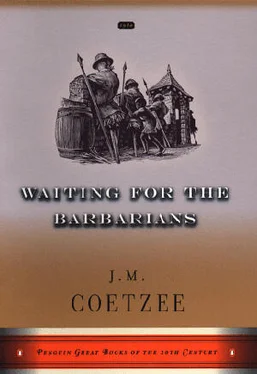* *
I am woken by a pounding on the door of my apartment. It is a man with a lantern, windburnt, gaunt, out of breath, in a soldier's greatcoat too large for him. He stares at me in bewilderment.
"Who are you?" I say.
"Where is the Warrant Officer?" he replies, panting, trying to look over my shoulder.
It is two o'clock in the morning. The gates have been opened to let in Colonel Joll's carriage, which stands with its shaft resting on the ground in the middle of the square. Several men shelter in its lee against the bitter wind. From the wall the men of the watch peer down.
"We need food, fresh horses, fodder," my visitor is saying. He trots ahead of me, opens the door of the carriage, speaks: "The Warrant Officer is not here, sir, he has left." At the window, in the moonlight, I catch a glimpse of Joll himself. He sees me too: the door is slammed shut, I hear the click of the bolt inside. Peering through the glass I can make him out sitting in the dim far corner, rigidly averting his face. I rap on the glass but he pays no attention. Then his underlings shoulder me away.
Thrown out of the darkness, a stone lands on the roof of the carriage.
Another of Joll's escort comes running up. "There is nothing," he pants. "The stables are empty, they have taken every single one." The man who has unharnessed the sweating horses begins to curse. A second stone misses the carriage and nearly hits me. They are being thrown from the walls.
"Listen to me," I say. "You are cold and tired. Stable the horses, come inside, have something to eat, tell us your story. We have had no news since you left. If that madman wants to sit in his carriage all night, let him sit."
They barely listen to me: famished, exhausted men who have done more than their duty in hauling this policeman to safety out of the clutches of the barbarians, they whisper together, already re-harnessing a pair of their weary horses.
I stare through the window at the faint blur against the blackness that is Colonel Joll. My cloak flaps, I shiver from the cold, but also from the tension of suppressed anger. An urge runs through me to smash the glass, to reach in and drag the man out through the jagged hole, to feel his flesh catch and tear on the edges, to hurl him to the ground and kick his body to pulp.
As though touched by this murderous current he reluctantly turns his face towards me. Then he sidles across the seat until he is looking at me through the glass. His face is naked, washed clean, perhaps by the blue moonlight, perhaps by physical exhaustion. I stare at his pale high temples. Memories of his mother's soft breast, of the tug in his hand of the first kite he ever flew, as well as of those intimate cruelties for which I abhor him, shelter in that beehive.
He looks out at me, his eyes searching my face. The dark lenses are gone. Must he too suppress an urge to reach out, claw me, blind me with splinters?
I have a lesson for him that I have long meditated. I mouth the words and watch him read them on my lips: "The crime that is latent in us we must inflict on ourselves," I say. I nod and nod, driving the message home. "Not on others," I say: I repeat the words, pointing at my chest, pointing at his. He watches my lips, his thin lips move in imitation, or perhaps in derision, I do not know. Another stone, heavier, perhaps a brick, hits the carriage with a thunderous clatter. He starts, the horses jerk in their traces.
Someone comes running up. "Go!" he shouts. He pushes past me, beats at the door of the carriage. His arms are full of loaves. "We must go!" he shouts. Colonel Joll slips the bolt and he tumbles the loaves in. The door slams shut. "Hurry!" he shouts. The carriage heaves into motion, its springs groaning.
I grip the man's arm. "Wait!" I cry. "I will not let you go until I know what has happened!"
"Can't you see?" he shouts, beating at my grasp. My hands are still weak; to hold him I have to clasp him in a hug. "Tell me and you can go!" I pant.
The carriage is nearing the gates. The two mounted men have already passed through; the other men run behind. Stones clatter against the carriage out of the darkness, shouts and curses rain down.
"What do you want to know?" he says, struggling vainly.
"Where is everyone else?"
"Gone. Scattered. All over the place. I don't know where they are. We had to find our own way. It was impossible to keep together." As his comrades disappear into the night he wrestles harder. "Let me go!" he sobs. He is no stronger than a child.
"In a minute. How could it be that the barbarians did this to you?"
"We froze in the mountains! We starved in the desert! Why did no one tell us it would be like that? We were not beaten-they led us out into the desert and then they vanished!"
"Who led you?"
"They-the barbarians! They lured us on and on, we could never catch them. They picked off the stragglers, they cut our horses loose in the night, they would not stand up to us!"
"So you gave up and came home?"
"Yes!"
"Do you expect me to believe that?"
He glares desperately back at me. "Why should I lie?" he shouts. "I don't want to be left behind, that is all!" He tears himself loose. Shielding his head with his hands, he races through the gate and into the darkness.
* *
Digging has ceased at the third well-site. Some of the diggers have already gone home, others stand around waiting for orders. "What is the trouble?" I say.
They point to the bones lying on a heap of fresh earth: a child's bones.
"There must have been a grave here," I say. "A strange place for a grave." We are on the vacant plot behind the barracks, between the barracks and the south wall. The bones are old, they have absorbed the colour of the red clay. "What do you want to do? We can start digging again nearer the wall if you like."
They help me to climb into the pit. Standing chest-deep I scratch away the earth around the side of a jawbone embedded in the wall. "Here is the skull," I say. But no, the skull has already been dug up, they show it to me.
"Look under your feet," says the foreman.
It is too dark to see, but when I chop lightly with the mattock I strike something hard; my fingers tell me it is bone.
"They aren't buried properly," he says. He squats at the lip of the pit. "They are lying just any old how, on top of each other."
"Yes," I say. "We can't dig here, can we?"
"No," he says.
"We must fill it in and start again nearer the wall."
He is silent. He reaches out a hand and helps me clamber out. The bystanders say nothing either. I have to toss the bones back in and shovel the first earth before they will pick up their spades.
* *
In the dream I stand again in the pit. The earth is damp, dark water seeps up, my feet squelch, it costs me a slow effort to lift them.
I feel under the surface, searching for the bones. My hand comes up with the corner of a jute sack, black, rotten, which crumbles away between my fingers. I dip back into the ooze. A fork, bent and tarnished. A dead bird, a parrot: I hold it by the tail, its bedraggled feathers hang down, its soggy wings droop, its eye sockets are empty. When I release it, it falls through the surface without a splash. "Poisoned water," I think. "I must be careful not to drink here. I must not touch my right hand to my mouth."
* *
I have not slept with a woman since I returned from the desert. Now at this most inappropriate of times my sex begins to reassert itself.
I sleep badly and wake up in the mornings with a sullen erection growing like a branch out of my groin. It has nothing to do with desire. Lying in my rumpled bed I wait in vain for it to go away. I try to invoke images of the girl who night after night slept here with me. I see her standing barelegged in her shift, one foot in the basin, waiting for me to wash her, her hand pressing down on my shoulder. I lather the stocky calf. She slips the shift up over her head. I lather her thighs; then I put the soap aside, embrace her hips, rub my face in her belly. I can smell the soap, feel the warmth of the water, the pressure of her hands. From the depths of that memory I reach out to touch myself. There is no leap of response. It is like touching my own wrist: part of myself, but hard, dull, a limb with no life of its own. I try to bring it off: futile, for there is no feeling. "I am tired," I tell myself.
Читать дальше












